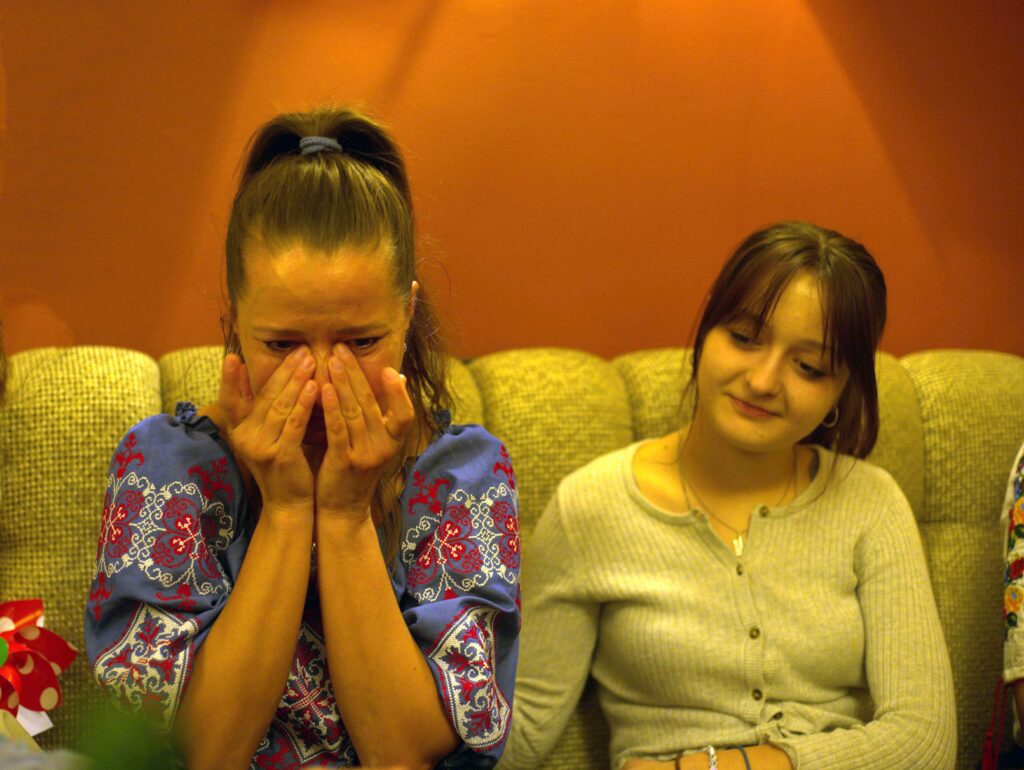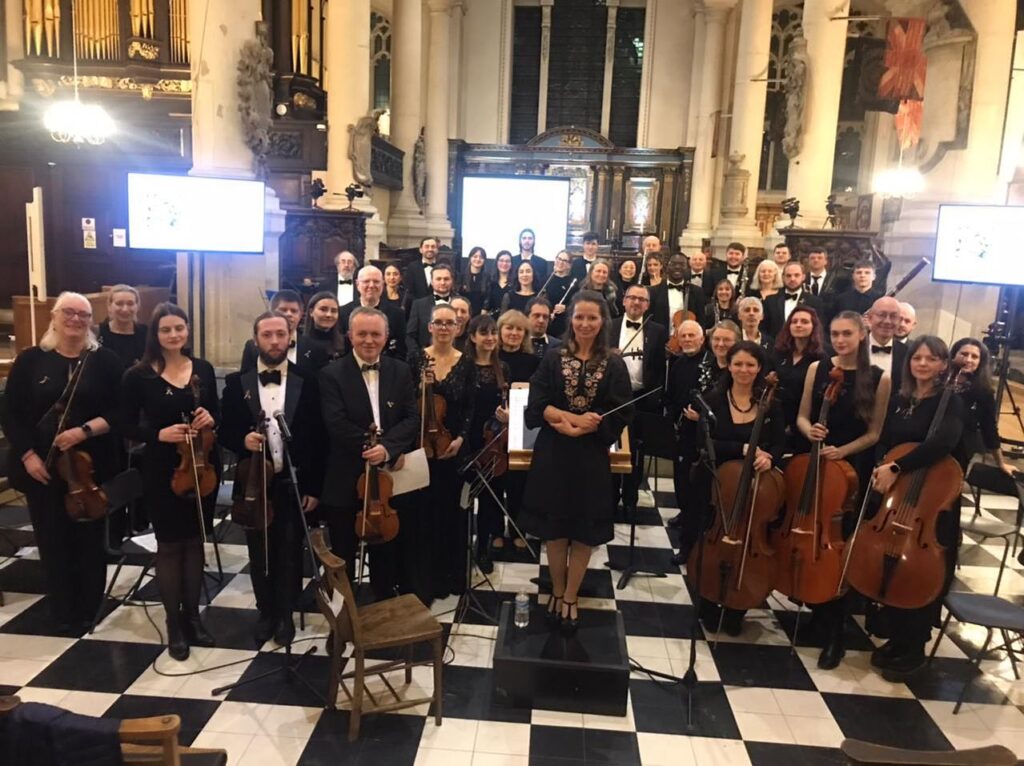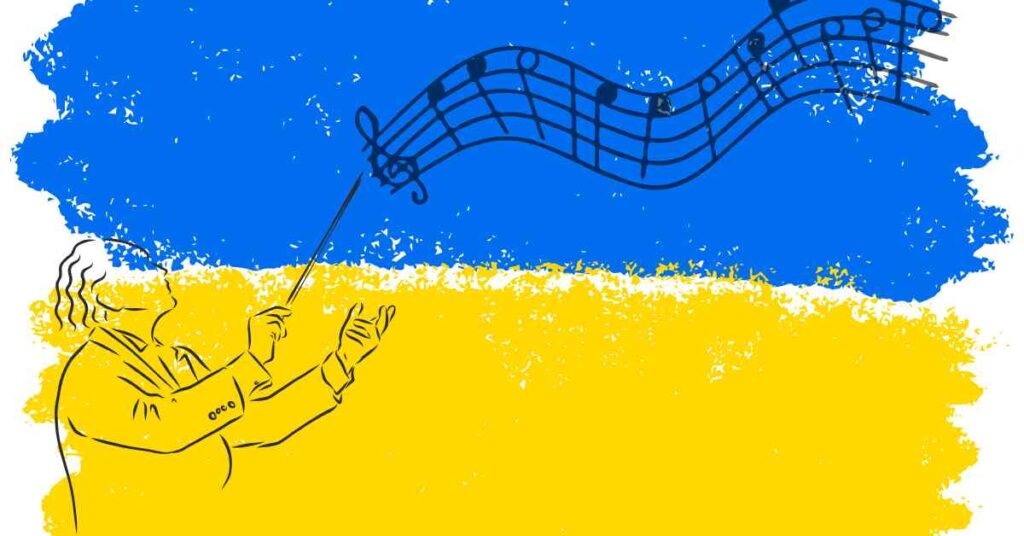When Russia invaded Ukraine in February 2022, Iryna Gould knew she wanted to do something to help her homeland.
So in November, Gould, who was later accompanied by six like-minded musicians, created the London Ukrainian Symphony Orchestra with the plan of holding a concert two months later at the Holy Sepulchre Church in Holborn. Desperate to not create just “another” concert for Ukraine, the team set their sights on an ambitious, potentially dangerous, goal.
Read: Dovetail: the orchestra of asylum seekers creating a community beyond music
Read more from our global voices here
Through donations raised through concert tickets, the musicians would buy instruments with the aim of delivering them by hand to music schools across Ukraine in April this year “Music helps children like therapy,” Gould says. “When they play their favourite instrument it takes them to a happy place where there are no bombs.”
The 50-hour journey was treacherous, filled with emotionally difficult stops to orphanages and music schools in some of the worst hit cities, including Kharkiv. “When you visit these places and speak to these people, you are never the same, it’s just heart-breaking,” says Gould. “When I was in Kharkiv I gave a little girl a violin and she’d been living in a cellar for six months. Can you imagine living in a cellar for six months?”
Despite knowing the dangers of visiting Ukraine, Gould felt a personal responsibility to go. “I didn’t just want to send the instruments and go ‘okay do whatever you want’, I wanted to see how they were going to be used and to see they went to the right place.” Gould’s 18-year-old daughter Anastasia accompanied her mother to Ukraine on a separate trip to Ukraine last December. “I’m half-English, half-Ukrainian so I have the privilege of being here and being safe,” says Anastasia. “The least I can do is support Ukraine through the orchestra and help the music schools.”

Gould says that classical music is a central part of Ukrainian culture and accessible to children. “They learn instruments from a young age,” says Gould. “During the summer there’s a vibrant music festival in Odessa.” Since the war broke out, the festival has been hosted by other European countries.
One of the orchestra’s priorities is to champion Ukrainian classic music. For this reason, the concert consisted of only Ukrainian repertoire. “Ukrainian composers must get recognition at the same level as western composers,” says Gould. “The Russian Empire used to take talented Ukrainian children to Moscow, say they grew up in Russia. Tchaikovsky’s grandfather was Ukrainian. We’re not interested in reclaiming them; we just want to be left alone and carry on with our own culture.”
When I was in Kharkiv I gave a little girl a violin. She’d been living in a cellar for six months.
Iryna Gould, founder of the London Ukrainian Symphony Orchestra
The concert ended with an original piece written by Gould. This was accompanied by a montage of pictures of soldiers on the frontline. “I wrote it for the soldiers who lost their lives. It was like a commemoration.”

Many members of the orchestra have faced unimaginable journeys to escape the war. Fifteen-year-old Sofia Lomidze is the youngest member of the orchestra. She is originally from Kharkiv and left with her family on the last train to Odessa in March 2022. From there, the family took a six-day journey across Europe before settling in Tbilisi, Georgia for a time. The family then decided to relocate to London last July. Lomidze is now studying the violin at Purcell School and has high aspirations: “It’s my dream to be a soloist or play in an orchestra at the Royal Albert Hall.”
Listen: Ukrainian classical music playlist
There are also Russian members of the orchestra, including 24-year-old cellist Arina Brovanova. She moved from Siberia to London to study for her master’s in composition for film and TV at the University of West London. When the war in Ukraine began, she decided to remain. Brovanova met Gould during her master’s. “Iryna contacted me saying ‘We’re doing this concert, would you like to join because we need cello players’,” she says.
The war is never far from people’s minds, especially sitting in London’s Ukrainian Social Club in Holland Park, set up by Ukrainians who fled to the UK in 1917 during the October Revolution. Everyone in the orchestra and at the social club knows someone who is still fighting. “My younger brother is 25 and he is on the frontline every day,” says Gould. “We haven’t heard from him in almost two weeks. It’s very scary,” says Gould.
I’m really proud to be a part of this orchestra. I can use my violin like a weapon and raise money to help Ukrainian music schools.
Nikita Vihorev, violinist
Being part of the orchestra has given members a means of helping back at home. “I’m really proud to be a part of this orchestra, I really feel like I can use my violin like a weapon and raise money to help Ukrainian music schools,” says Ukrainian violinist Nikita Vihorev. Lomidze echoed Vihorev’s sentiment: “I’m really grateful to Iryna; she gave me the feeling that I can help my country from the UK. It’s a really great feeling that we can do work here together while playing our instruments.”
Brovanova and Russian cellist Alexandra Somova both joined the orchestra as a means of protesting the actions of the Russian government. “I had friends tell me I’m wrong for not posting anything on Instagram,” says Brovanova. “I would prefer instead of posting and saying words to do something, even though they are small actions.” Somova agrees: “I can show my support for the Ukrainian people and that I completely disagree with what’s happening.”
The future of the London Ukrainian Symphony Orchestra is now reliant on securing long-term funding. “The first concert was a charity concert to raise money for Ukraine. Now we’re looking for someone who can look after the orchestra, to sustain the orchestra to help pay the bills,” says Gould. “It would be great if the musicians could perform. We all enjoy doing what we’re doing helping our beloved Ukraine and then at the same time we’re able to earn something for the orchestra as well.”
The orchestra plans to continue holding concerts, to make sure the hardship Ukraine faces remains relevant. Gould wants to keep travelling to Ukraine to deliver instruments. “The message I want to send is no matter how tragic the situation, light will overcome darkness,” says Gould. “Just give people hope.”
Read: Lebanon’s national conservative in the eye of an economic storm
Read more from our global voices here

